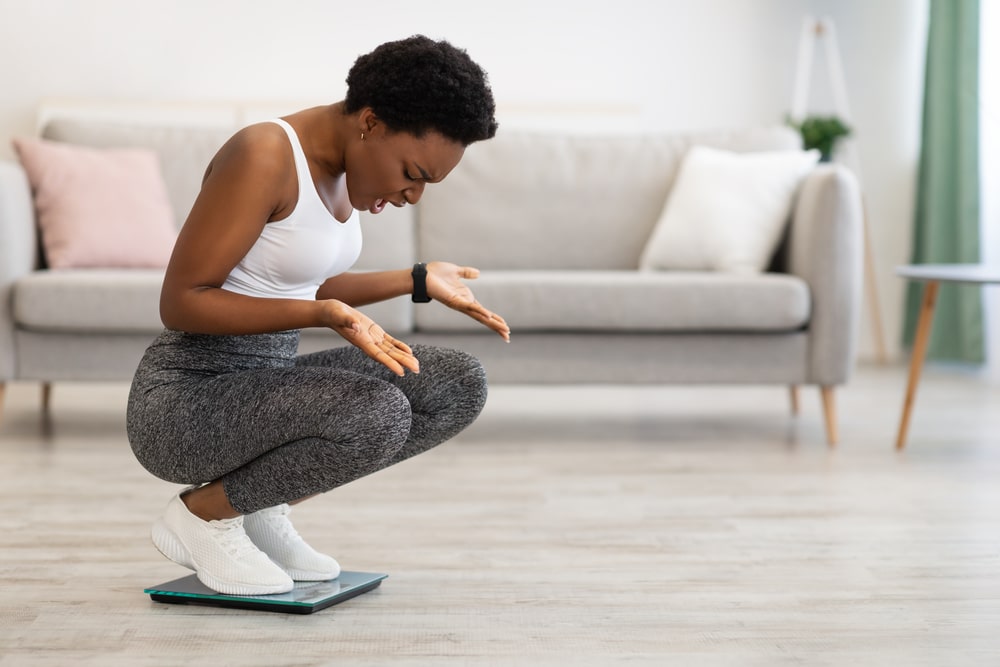People are keen on maintaining a healthy weight for several reasons. For some, it is simply a matter of aesthetics. For others, they fear that being overweight could lead to many health problems, such as diabetes, heart disease, and joint pain (12). For people with obesophobia, weight is an obsession. They may see themselves as overweight when they are not, or they may be so afraid of gaining weight that they become fixated on calorie counting and exercise. This can lead to an unhealthy relationship with food and a preoccupation with body image. Like most phobias, learning more about the condition can be helpful. This article will explore obesophobia in more depth, including its causes, symptoms, and treatment options.
Get your personalized
meal plan!
What Is Obesophobia?
Obesophobia is an intense fear of gaining weight. It is also known as pocrescophobia or lipophobia. This phobia can manifest in different ways. It involves an irrational fear of becoming obese or gaining weight, even if you are a healthy weight (16).
In some cases, this phobia can lead to an eating disorder known as anorexia nervosa.
Obesophobia is different from orthorexia, which is another eating disorder characterized by an obsession with healthy eating (17).
People with orthorexia are often fixated on the quality of the food they eat, rather than the quantity. They may avoid certain foods, such as those that are processed or high in sugar.
What Causes Obesophobia?
There is no single cause of obesophobia. It may develop due to a combination of factors, including:
Weight Stigma
Weight stigma is the discrimination or prejudice against people who are overweight or obese. This can come from family, friends, strangers, and the media. Weight stigma can lead to feelings of shame, worthlessness, and anxiety (23).
Diet Culture
Diet culture is the set of beliefs that:
- Thinness is superior to other body types
- Weight loss is desirable
- Food should be restricted to control weight
Diet culture is pervasive in Western society. It can be found in the media, in advertising, and even in some medical settings. Diet culture often leads to disordered eating, as people try to achieve an unrealistic and unhealthy body size (21).
Read More: Dairy Free Protein Powder Options For Muscle Mass Development And Weight Loss
Trauma
Some people develop obesophobia after experiencing a traumatic event, such as being ridiculed for their weight. This can lead to feelings of shame, anxiety, and fear.
Anxiety Disorders
Some types of anxiety disorders can increase the risk of developing obesophobia. These include social anxiety disorder, panic disorder, and generalized anxiety disorder.
In the case of social anxiety disorder, obesophobia may develop as a result of the fear of being judged or rejected by others. This can lead to avoidance behaviors, such as skipping social events or avoiding public places.
Internal Predispositions
Like all other phobias, obesophobia may be partly due to an individual’s internal predispositions. This includes things like genetics, brain chemistry, and personality.
For example, people who are naturally anxious or have a family history of anxiety disorders may be more likely to develop obesophobia when exposed to triggers like weight stigma or diet culture.
What Are The Symptoms Of Obesophobia?
The symptoms of obesophobia can vary from person to person. They may be mild in some cases and severe in others. Some common signs include:
- Avoiding eating in public
- Refusing to eat certain foods
- Excessive exercise
- Constant thoughts about weight and body image
- Weighing yourself multiple times a day
- Avoiding social events
- Missing work or school
- Isolating yourself from friends and family
- Disliking overweight people
- Being underweight or malnourished
If you have obesophobia, you may even experience the symptoms of a panic attack whenever the topic of weight gain is brought up. These symptoms include (18):
- Shortness of breath
- Chest pain
- Rapid heartbeat
- Nausea
- Dizziness
- Trembling or shaking
Looking for a way to break the vicious cycle of weight loss and tone up all the jiggly parts? Watch the extra pounds fly off and your muscles firm up with the BetterMe app!
What Are The Complications Of Obesophobia?
The main complication of obesophobia is an unhealthy obsession with food and weight gain. This can lead or contribute to a slew of other conditions including:
Anorexia Nervosa
Anorexia nervosa is closely related to obesophobia. It’s an eating disorder characterized by extreme weight loss and a fear of gaining weight (1).
People with anorexia often restrict their food intake and may also engage in purging behaviors like self-induced vomiting or excessive exercise.
Anorexia nervosa can have serious health consequences, including organ damage, heart problems, and even death (2).
Bulimia Nervosa
Bulimia nervosa is another eating disorder that’s closely related to obesophobia. It’s characterized by episodes of binge eating followed by purging behaviors like self-induced vomiting or the use of laxatives (5).
Like anorexia, bulimia can have serious health consequences, including electrolyte imbalances, heart problems, and gastrointestinal issues (4) (5).
Body Dysmorphic Disorder
Body dysmorphic disorder (BDD) is a condition characterized by an intense preoccupation with one or more perceived physical flaws. People with BDD often obsess over their weight, even if they’re at a healthy weight (10).
BDD can lead to social isolation, depression, and even suicidal thoughts or behaviors.
Purging Disorder
Purging disorder is an eating disorder that’s similar to bulimia nervosa. However, purging disorder doesn’t necessarily involve binge eating.
Instead, people with purging disorder engage in purging behaviors like self-induced vomiting or the use of laxatives after eating even small amounts of food (3).
Like bulimia and anorexia, purging disorder can have serious health consequences. These include electrolyte imbalances, heart problems, and gastrointestinal issues.
Low Self Esteem
People with obesophobia often have low self-esteem. This is because they’re constantly worried about their weight and body image. Low self-esteem can lead to social isolation, depression, and anxiety, especially among young adults (15).
Physical Health Consequences
Obesophobia can also have physical health consequences. This is because people with obesophobia often engage in unhealthy behaviors like restrictive diets, excessive exercise, and purging.
These behaviors can lead to malnutrition, electrolyte imbalances, heart problems, and gastrointestinal issues (3) (7) (11). Some of these physical consequences can even be life-threatening.
Read More: Rowing For Weight Loss: Calories Burned, Benefits And More
How Is Obesophobia Diagnosed?
Obesophobia follows the same diagnostic criteria as other phobias. Your doctor will analyze your symptoms using the criteria outlined in the Diagnostic and Statistical Manual of Mental Disorders (DSM-5) (20).
To be diagnosed with obesophobia, you must:
- Have a persistent fear of gaining weight or becoming obese
- Have a fear that is out of proportion to the actual danger
- Have a fear that almost always causes immediate anxiety
- Have avoidance behaviors that interfere with your daily life
- The symptoms must last for 6 months or more
- The symptoms must not be better explained by another mental disorder
Your doctor will also rule out any physical causes of your symptoms. This is important, as some medical conditions can cause weight gain and anxiety. These conditions include hypothyroidism, Cushing’s syndrome, and polycystic ovary syndrome (PCOS) (22).
How Is Obesophobia Treated?
Obesophobia can be treated with a combination of therapy, medication, and self-care.
Therapy
Cognitive-behavioral therapy (CBT) is a type of therapy that can help treat obesophobia. CBT focuses on changing the negative thoughts and behaviors that contribute to the phobia (6).
During CBT, you will work with a therapist to identify your triggers and learn how to manage your anxiety. You may also learn coping techniques, such as deep breathing and relaxation.
Medication
Your doctor may prescribe medication to help manage your anxiety. The most common type of medication used for this purpose is a selective serotonin reuptake inhibitor (SSRI). SSRIs are a type of antidepressant that can help reduce anxiety and improve mood (19).
Self-Care
In addition to therapy and medication, there are things you can do at home to manage your obesophobia. These self-care tips can help reduce your anxiety and improve your quality of life:
- Get regular exercise: Exercise can help reduce stress and anxiety. It can also boost mood and improve sleep (8). Talk to your doctor about whether exercise is safe and appropriate for you.
- Eat a healthy diet: Eating nutritious foods can help you feel better physically and mentally. Work with your therapist to find ways to incorporate healthy and nutritious foods without obsessing over your diet or restricting other foods.
- Avoid diet culture: Diet culture often leads to disordered eating and body image issues. Try to avoid any triggering content, such as pro-ana websites or thinspo hashtags.
- Practice mindfulness: Mindfulness can help you focus on the present moment and reduce anxiety (9). You can practice mindfulness through activities like meditation, yoga, and breathing exercises.
- Seek support: Talking to friends or family members about your anxiety can help you feel less alone. You can also join a support group for people with obesophobia.
If you tend to let yourself off the hook, raise the white flag when things get tougher than you expected, send yourself on an unconscious binge-eating trip – BetterMe app is here to help you leave all of these sabotaging habits in the past!
How Intuitive Eating Can Help
If you have obesophobia, you may be no stranger to restrictive diets. However, these diets often do more harm than good. They can contribute to disordered eating, body image issues, and nutritional deficiencies.
Intuitive eating is an alternative approach to food and nutrition. It emphasizes listening to your body’s hunger cues and eating in a way that is satisfying and enjoyable (14).
Intuitive eating can help you break the cycle of dieting and disordered eating. It can also improve your relationship with food and your body (13). If you’re interested in trying intuitive eating, talk to a registered dietitian or therapist who specializes in this approach.
The following tips can also help you get started with intuitive eating:
- Eat when you’re hungry: Don’t wait until you’re starving to eat. Ignoring your hunger cues can make it difficult for you to recognize them in the future.
- Honor your fullness: Once you feel satisfied, stop eating. It’s okay to save food for later if you get hungry.
- Make peace with food: Don’t label foods as “good” or “bad.” All foods can be part of a healthy diet.
- Respect your body: Accept your body as it is. strive for health, not perfection.
- Find joy in movement: Exercise should be something you enjoy, not something you have to do. Choose activities that make you feel good.
If you have obesophobia, know that you’re not alone. Recognize your triggers and find ways to cope with your anxiety. With treatment, you can learn to manage your fear and live a healthy, fulfilled life.
The Bottom Line
Obesophobia is a type of phobia that involves intense fear of gaining weight. This phobia can lead to avoidance behaviors, such as skipping social events or avoiding certain foods. Obesophobia is a treatable condition, and with the right help, you can manage your anxiety and live a healthy, happy life.
DISCLAIMER:
This article is intended for general informational purposes only and does not serve to address individual circumstances. It is not a substitute for professional advice or help and should not be relied on for making any kind of decision-making. Any action taken as a direct or indirect result of the information in this article is entirely at your own risk and is your sole responsibility.
BetterMe, its content staff, and its medical advisors accept no responsibility for inaccuracies, errors, misstatements, inconsistencies, or omissions and specifically disclaim any liability, loss or risk, personal, professional or otherwise, which may be incurred as a consequence, directly or indirectly, of the use and/or application of any content.
You should always seek the advice of your physician or other qualified health provider with any questions you may have regarding a medical condition or your specific situation. Never disregard professional medical advice or delay seeking it because of BetterMe content. If you suspect or think you may have a medical emergency, call your doctor.
SOURCES:
- Anorexia nervosa (2007, ncbi.nlm.nih.gov)
- Anorexia nervosa – medical complications (2015, biomedcentral.com)
- A Review of Purging Disorder Through Meta-Analysis (2017, ncbi.nlm.nih.gov)
- Association of Bulimia Nervosa With Long-term Risk of Cardiovascular Disease and Mortality Among Women (2019, jamanetwork.com)
- Bulimia Nervosa (2021, ncbi.nlm.nih.gov)
- Cognitive Behavioral Therapy for Weight Management and Eating Disorders in Children and Adolescents (2012, ncbi.nlm.nih.gov)
- Compulsive exercise in eating disorders: proposal for a definition and a clinical assessment (2018, biomedcentral.com)
- Effects of Exercise and Physical Activity on Anxiety | Psychiatry (2013, frontiersin.org)
- Effects of Mindfulness on Psychological Health: A Review of Empirical Studies (2011, ncbi.nlm.nih.gov)
- Full article: Body dysmorphic disorder (2022, tandfonline.com)
- Have Our Attempts to Curb Obesity Done More Harm Than Good? (2020, ncbi.nlm.nih.gov)
- Health impacts of Obesity (2015, ncbi.nlm.nih.gov)
- Intuitive eating in light of other eating styles and motives: Experiences with construct validity and the Hungarian adaptation of the Intuitive Eating Scale-2 – ScienceDirect (2021, sciencedirect.com)
- Learning to eat intuitively: A qualitative exploration of the experience of mid-age women (2019, ncbi.nlm.nih.gov)
- Low Self-Esteem and Its Association With Anxiety, Depression, and Suicidal Ideation in Vietnamese Secondary School Students: A Cross-Sectional Study (2019, frontiersin.org)
- Obesophobia (Fear of Gaining Weight): Causes, Symptoms & Treatment (2022, clevelandclinic.org)
- Orthorexia nervosa: A behavioral complex or a psychological condition? (2018, ncbi.nlm.nih.gov)
- Panic Disorder (2022, ncbi.nlm.nih.gov)
- Selective Serotonin Reuptake Inhibitors – StatPearls – NCBI Bookshelf (2022, ncbi.nlm.nih.gov)
- Table 3.11, DSM-IV to DSM-5 Specific Phobia Comparison (2016, ncbi.nlm.nih.gov)
- The Effects of Eating Disorder Knowledge on Dieting Beliefs (2021, sc.edu)
- Weight gain – unintentional: MedlinePlus Medical Encyclopedia (2021, medlineplus.gov)
- Weight stigma and health behaviors: evidence from the Eating in America Study (2021, nature.com)














